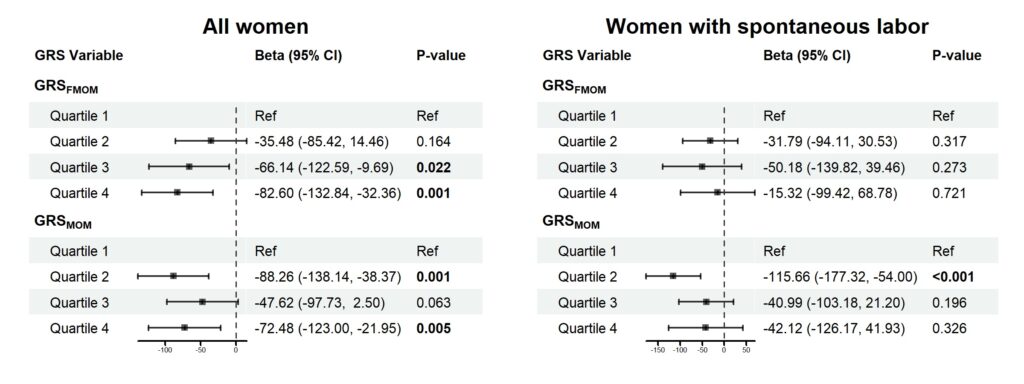Genetics
Polygenic effect of gestational duration reducing maternal variants on birth weight in an ancestrally diverse cohort Tesfa Dejenie Habtewold* Tesfa Dejenie Habtewold Prabhavi Wijesiriwardhana Richard J. Biedrzycki Fasil Tekola-Ayele
Introduction: The maternal genome influences gestational duration and birth weight. However, whether genetic variants that control gestational duration influence birth weight is unclear. This study aimed to investigate the impact of gestational duration-reducing variants on birth weight in 2,056 ancestrally diverse pregnant women from the NICHD Fetal Growth Studies – Singletons cohort.
Methods: Genetic risk score (GRS) was calculated using 20 maternal variants associated with gestational duration irrespective of their effect through fetal genome (GRSFMOM) and a subset of 14 variants with maternal-only effect (GRSMOM) based on the latest genome-wide association study in Europeans. The association between GRSs and birth weight (in grams, g) was tested using linear regression analyses adjusted for fetal sex, gestational age, maternal sociodemographic factors, and the top five genomic principal components. Sensitivity analysis was performed in women with spontaneous onset of labor.
Results: The third and fourth GRSFMOM quartiles were significantly associated with 66.1 g (95% CI=-122.6, -9.7, p=0.022) and 82.6 g (95% CI=-132.8, -32.4, p=0.001) lower birth weight compared to the first quartile, respectively. The association was attenuated among women with spontaneous onset of labor. The second and fourth GRSMOM quartiles were significantly associated with 88.3 g (95% CI=-138.1, -38.4, p=0.001) and 72.5 g (95% CI=-123.0, -21.9, p=0.005) lower birth weight, respectively. Among women with spontaneous onset of labor, the second GRSMOM quartile was significantly associated with a 115.7 g (95% CI=-177.3, -54.0, p < 0.001) lower birth weight.
Conclusions: Among ancestrally diverse pregnant women, the polygenic effect of European-derived maternal genetic variants that shorten gestational duration also lowered birth weight. The findings do not support the hypothesis that fetuses with a maternal genetic predisposition to shorter gestation grow faster.

